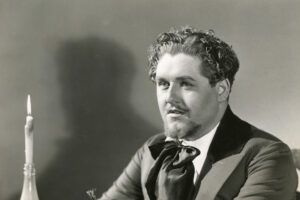

Piero Faggioni’s production has been unearthed for reasons that surely have more to do with Ezio Frigerio’s spectacular Art Nouveau sets and Franca Squarciapino’s gorgeous costumes (providing a pre-Raphaelite view of medieval Italy suitable to a late Verismo score) than with any musical qualifications.
When the production was new, rumored to have been a personal whim of Mrs. Donald Harrington, who paid for it, Francesca starred Renata Scotto, Placido Domingo and Cornell MacNeil, singers who, whatever the state of their vocal health at the time, understood the style and put it across. Even so, it was a tough sell—the house was heavily papered back then, which is how I got in. I’m told the old recording that stars Olivero and Del Monaco is a thing to treasure. I’ll take that on faith, but there are 30 scores I’d rather have heard them perform.
Gabriele d’Annunzio, the only opera librettist who also became a Fascist dictator (Fiume, 1919), created the text of Francesca da Rimini from the hit play he’d written for his lover, Eleonora Duse. Duse was profiled (word!) running a gamut of emotions in this exfoliation of Dante’s brief, beloved anecdote of adulterers caught and killed in flagrante before they could confess and escape damnation. Duse got to pluck a rose, radiantly, to give to her fiancé, whom we know is not her fiancé. Poignant, eh?
She also presented a cup of wine to both her husband and her lover, like a muddled Isolde. (D’Annunzio adored Wagner.) She got to confide and not confide in her sympathetic ladies-in-waiting. She got to fend off one brother-in-law and seduce another. She was stabbed in the back just before the final curtain, having thrown herself between husband and lover. She must have been terrific, and it’s all in the libretto. I kept imagining the wonders Puccini could have done with a text like this. Zandonai doesn’t.
The reason I doubt vocal ability was behind this revival is, well, the inappropriate leading singers. Dutch soprano Eva-Maria Westbroek has been performing Gioconda and Forza del Destino here and there, more of a comment on the scarcity of lirico-spinto talent than any tribute to her own abilities. She sings a good note now and then, hearty chest plaints and such, but the line never lingers or floats. She fades without spinning out. She emotes like a demon, having no doubt read up on Duse, but there is more feeling in her costumes than in her singing. The costumes evolve from virginal white in Act I through rose pink to salmon to blood red to purple. Without sustained melody, this is icing without a cake.
Marcello Giordani might have been a passable Paolo ten years ago. Now he tends to bleat and strain and miss pitches entirely, and his acting is not worthy of a Duse—nor does he cut an attractive figure. If this contract was written five years ago, it should have been reconsidered based on the current state of his voice. But what did voice have to do with any of this? If there were Oliveros and Del Monacos around, perhaps there would be some slight point to reviving Francesca. Otherwise—I don’t get it.
There are a lot of good voices surrounding the central figures at the Met and, happily, Zandonai built up their parts to rather more than make-weight. Mark Delavan sang Francesca’s murderous and unattractive husband, Gianciotto, with power and chilling threat; there was excitement in his duet with Westbroek in Act IV because you sensed he was a wild card, capable of anything. (Those Wotans in San Francisco evidently taught him how to seethe.) Robert Brubaker implied a certain adolescent hysterical intensity as the maddened kid brother, Malatestino.
The ladies had the best music of the score and did exquisite things with it. Dina Kuznetsova, as Francesca’s apprehensive sister, joined Westbroek in a charming duet. Ginger Costa-Jackson, who always gives pleasure, sang a contralto slave girl, Smaragdi, with lustrous, smoky colors.
The quartet of attendants were Disella Larusdottir, Caitlin Lynch, Patricia Risley and Renee Tatum. Their girlish glee in Act I sets up Francesca’s happy delusions, and their “Spring” quartet in Act III is one of the few numbers from the opera that is ever excerpted, but I found the lullaby with which they opened the final scene especially appealing. Appealing is nice, but at such an ominous moment—well, think of what Verdi could have done.
Marco Armiliato led the Met orchestra in a clean, clear performance with properly shocking jolts from double basses and a tiny, costumed onstage band, including a lute. David Kneuss, who restaged the production, has the Malatesta army in Act II stand at attention staring up at Francesca and Paolo as they confess their immoral love to each other, which can’t be the ideal way to keep it secret from Gianciotto. At least turn the soldiers around, hey?
The performance takes three and a half hours because the wonderful sets—and they are wonderful, and I wish someone would write an opera for them—take ages to change, requiring three intermissions, take ‘em or leave ‘em.
Photo: Marty Sohl


























Comments